Permission Examples¶
This document is for administrators and data stewards learning to set up different types of attribute-based access permissions using Okera. Some other useful reference docs are:
Example 1: Column-Level Access Permission Using Attributes¶
In this example, we create permissions that restrict access to columns that meet certain conditions. We give access to all datasets inside the sales database to any user with the analyst_role, except for any columns tagged as security.pii.
Here's the permission definition for the okera_sample.users dataset in the permission builder:
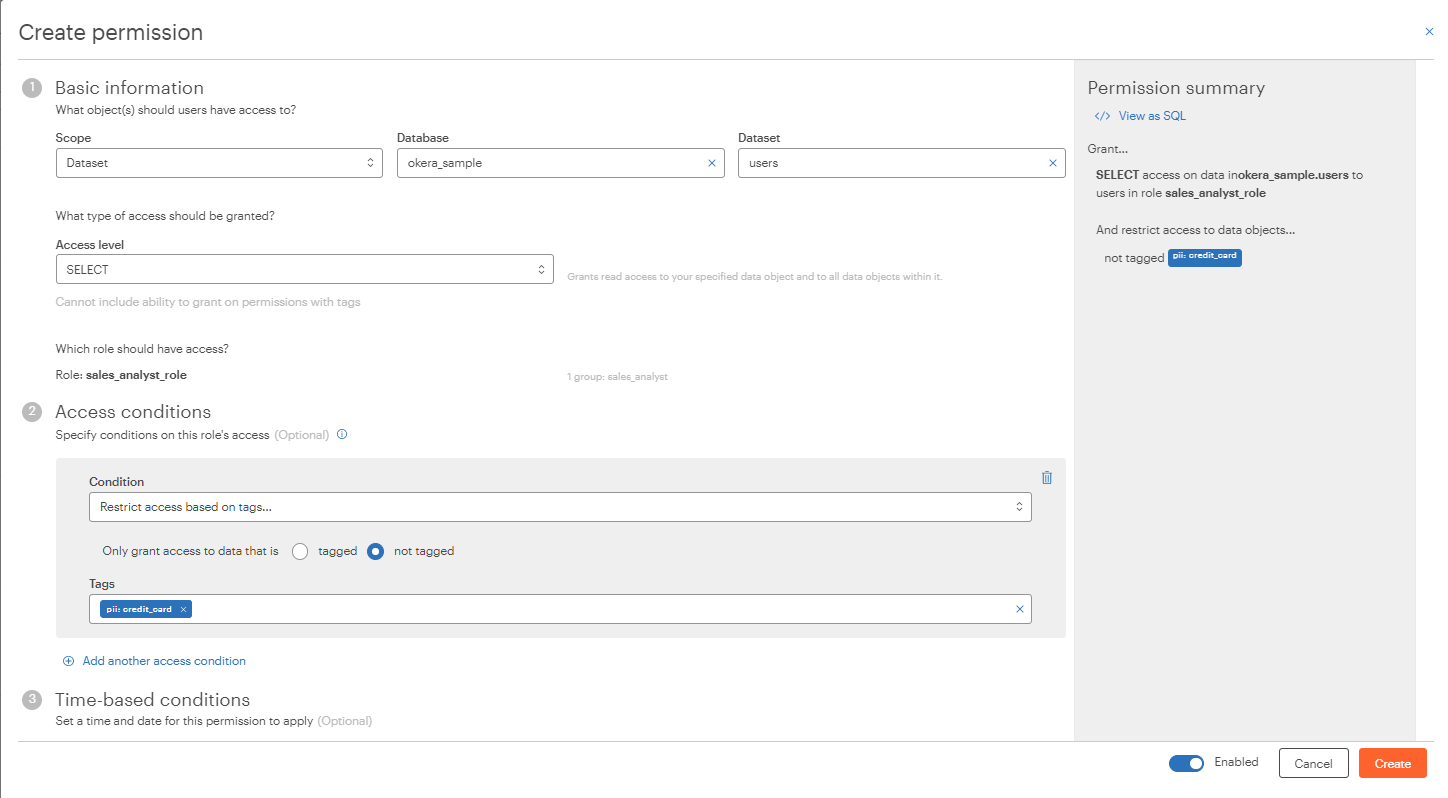
Here's the permission definition in SQL syntax:
GRANT SELECT ON TABLE `okera_sample`.`users`
HAVING ATTRIBUTE NOT IN (`pii`.`credit_card`)
TO ROLE `sales_analyst_role`
POLICYPROPERTIES('enabled'='true');
An admin sees the original data with all data columns, but users with the sales_analyst_role see only columns that are not tagged pii.credit_card.
| User | Has Access? | What data do they see? |
|---|---|---|
| Administrators | ✅ | Original data |
Users with sales_analyst_role |
✅ | Original data without the credit card column (which was tagged as pii.credit_card) |
Users without sales_analyst_role |
❌ | N/A |
In this example, only columns that do not have the pii.credit_card tag on them can be viewed.
To only give access to columns with a specific tag (for example, the pii.credit_card tag) use the following SQL syntax:
GRANT SELECT ON TABLE `okera_sample`.`users`
HAVING ATTRIBUTE IN (`pii`.`credit_card`)
TO ROLE `sales_analyst_role`
POLICYPROPERTIES('enabled'='true');
Example 2: Masking¶
In this example, we use masking to anonymize or redact sensitive data values. We give access to all datasets inside the okera_sample database to any user with the sales_analyst_role, but only show the last four digits of the credit card numbers. To do this, we use the mask_ccn() privacy function.
Here's the permission definition for the okera_sample database in the permission builder. We have added a transform condition applying the mask_ccn() function to any data tagged pii.credit_card.
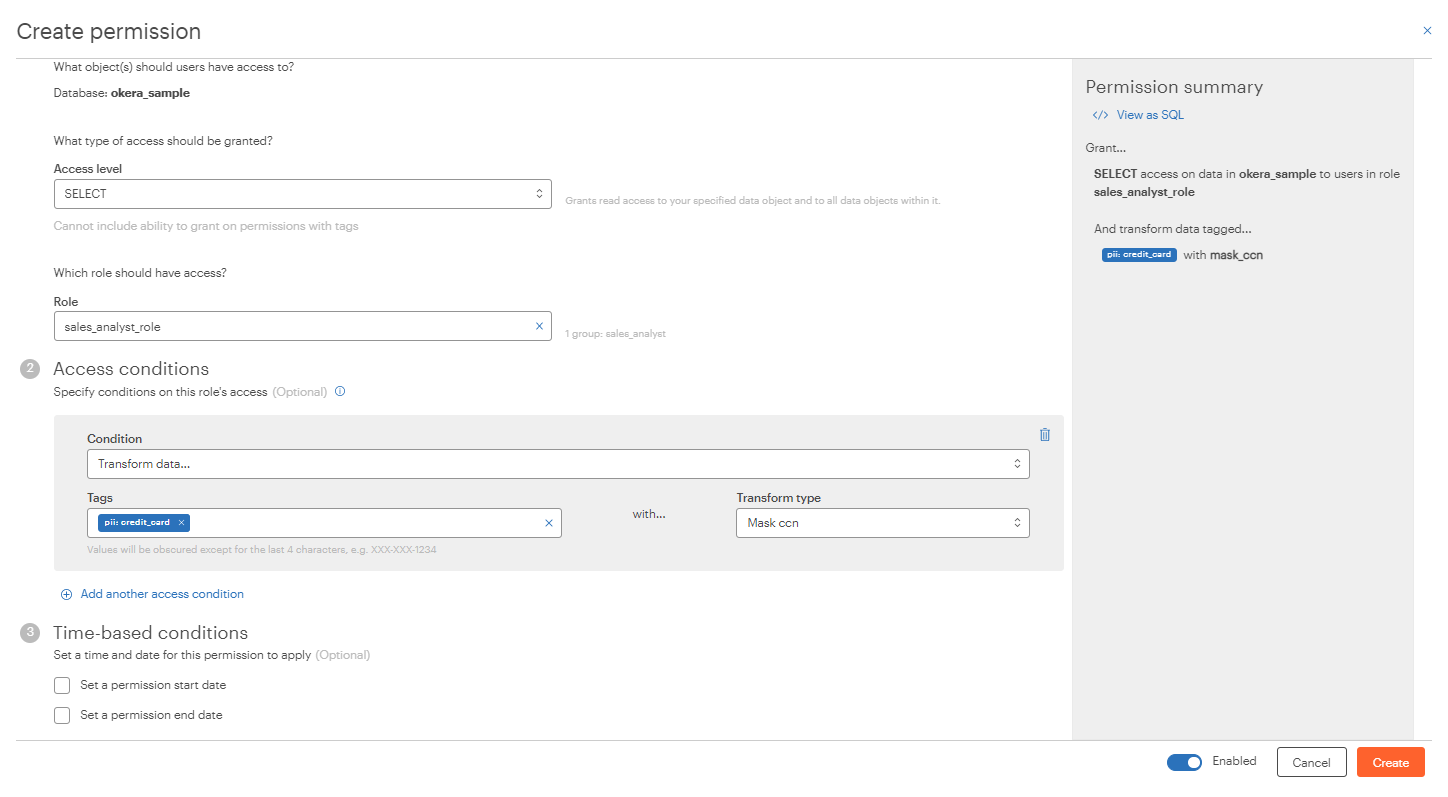
Here's the permission definition in SQL syntax:
GRANT SELECT ON DATABASE `okera_sample`
TRANSFORM `pii`.`credit_card` WITH `mask_ccn`()
TO ROLE `sales_analyst_role`
POLICYPROPERTIES('enabled'='true');
An admin sees the original data with all data columns, but users with the sales_analyst_role see only the last four digits of columns tagged pii.credit_card.
| User | Has Access? | What data do they see? |
|---|---|---|
| Administrators | ✅ | Original data |
Users with sales_analyst_role |
✅ | Can see any table inside the okera_sales database, except any column tagged pii.credit_card will be masked except for the last four digits. |
Users without sales_analyst_role |
❌ | N/A |
Example 3: Tokenization¶
Tokenization is a pseudonymization technique that substitutes a non-sensitive token for a sensitive value. Okera offers different tokenization functions depending on whether you want preserve the format or maintain referential integrity. Referential integrity means the resulting token is always the same for a given value across tables, so that analytical correlations (such as joins) are still possible. See Privacy and Security Functions for more information.
This example replaces values with a format-preserving token that maintains referential integrity. Access is given to all objects in the okera_sample database for any user with the sales_analyst_role, but any columns tagged protected.transform are tokenized. Tokens for each value are unique for each user, but still allow users to join across datasets for analytical correlations.
The tokenize() privacy function is used for this example.
Here's what a regular tokenization permission definition for the okera_sample database would look like in the permission builder:
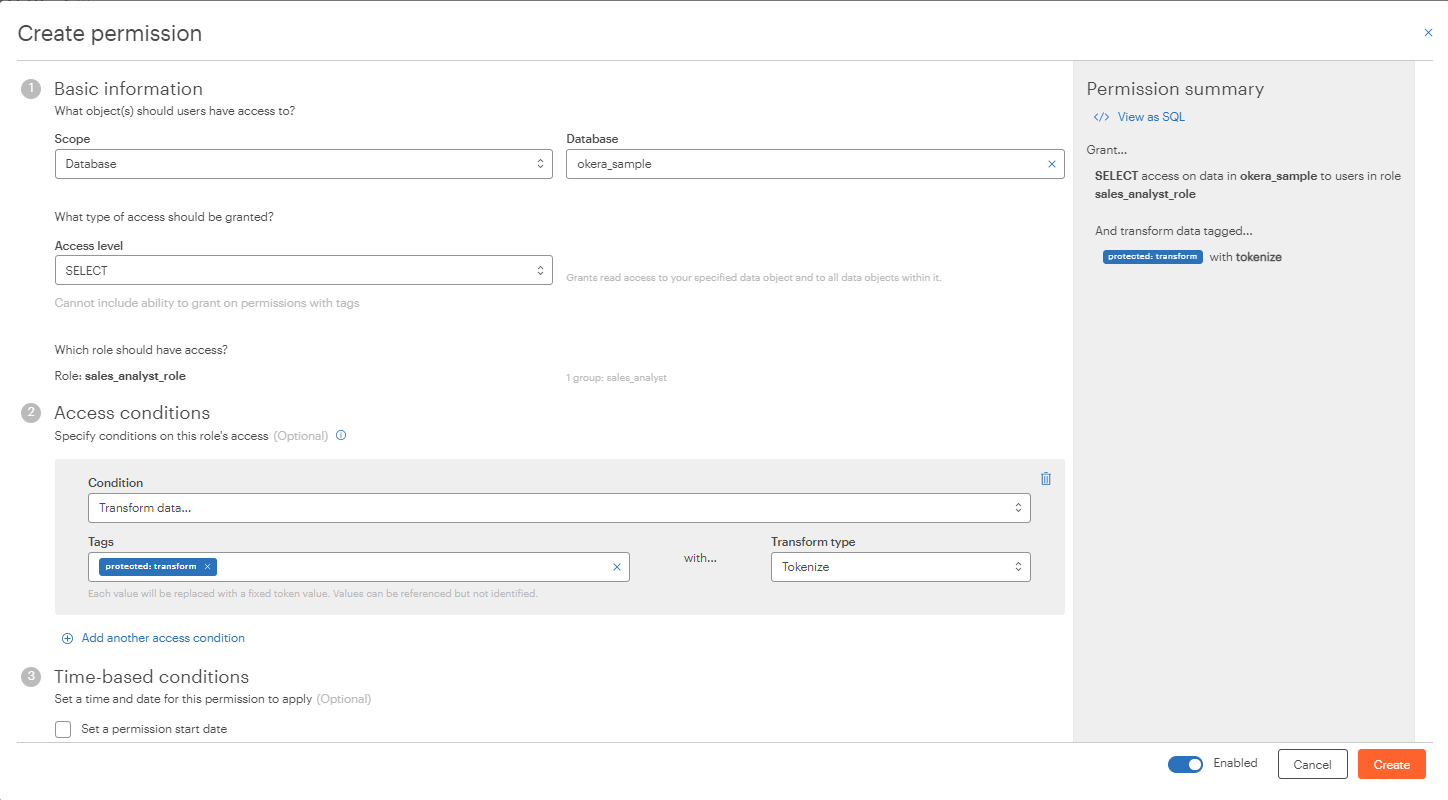
Here's the permission definition in SQL syntax:
GRANT SELECT ON DATABASE `okera_sample`
TRANSFORM `protected`.`transform` WITH `tokenize`()
TO ROLE `sales_analyst_role`
POLICYPROPERTIES('enabled'='true');
However, in our example we want tokens to be unique per user, so we must set the signed_user() argument for the tokenization function to true. If we don't set this to true, all users will see the same tokenized values for a given input.
Here's the updated permission definition in the permission builder.
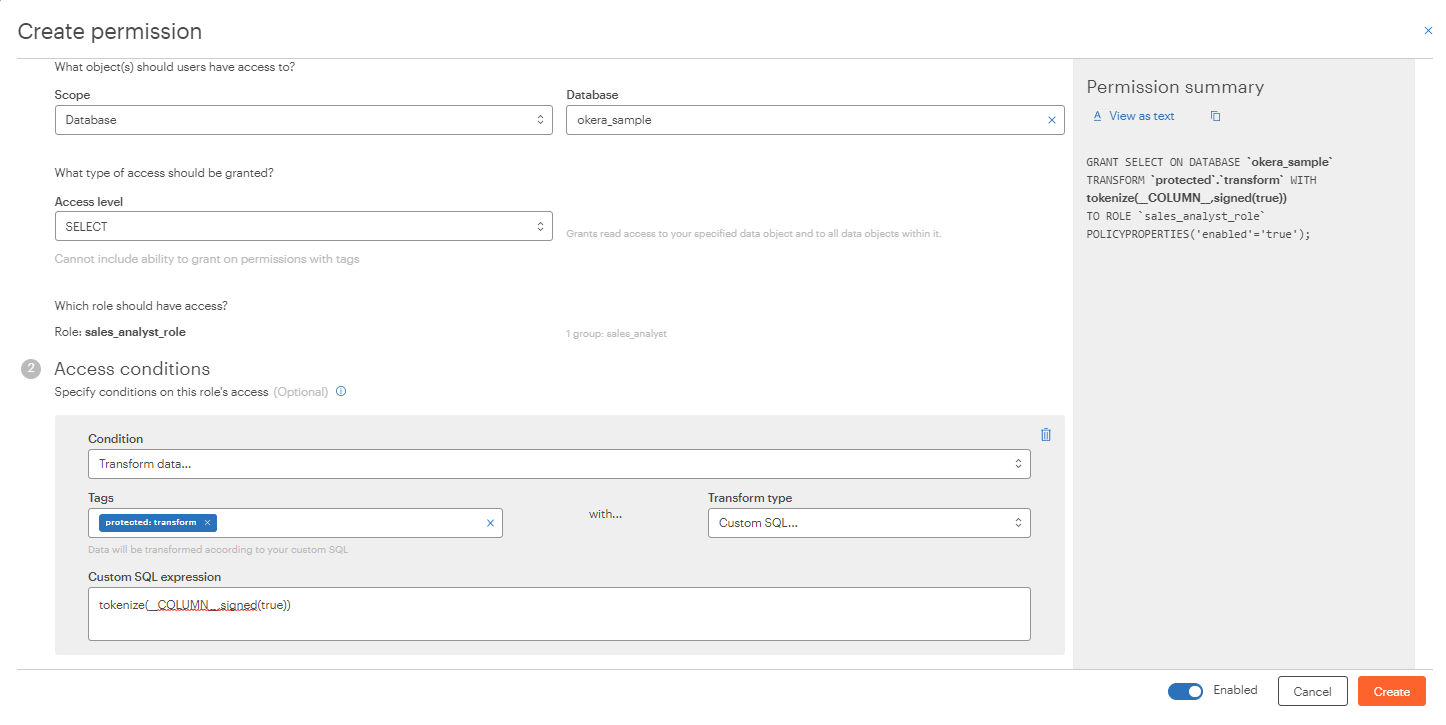
Here's the updated permission definition in SQL syntax:
GRANT SELECT ON DATABASE `okera_sample`
TRANSFORM `protected`.`transform` WITH tokenize(__COLUMN__,signed(true))
TO ROLE `sales_analyst_role`
POLICYPROPERTIES('enabled'='true');
Note: Within Okera's permission syntax,
__COLUMN__is simply a variable for a column that is dynamically referenced by its tags.
Tip
To see other arguments that can be used to configure the behavior of the tokenization functions see Tokenization.
An admin sees the original data with all data columns and no tokenization, but users with the sales_analyst_role see the values of any columns tagged with protected.transform replaced with a format preserving token.
| User | Has Access? | What data do they see? |
|---|---|---|
| Admininistrators | ✅ | Original data |
Users with sales_analyst_role |
✅ | Can see any dataset inside the sales database, however any columns tagged with protected.transform have their sensitive values replaced with a format-preserving token that maintains referential integrity. This token is unique per user, but still allows users to join across datasets. |
Users without sales_analyst_role |
❌ | N/A |
Suppose we had two tables inside the sales database – sales.customers and sales.orders, both containing the uid column tagged as protected.transform. Here's sample data from sales.customers:
| uid | dob | gender | ccn |
|---|---|---|---|
| 0001BDD9-EABF-4D0D-81BD-D9EABFCD0D7D | 8-Apr-84 | F | 3771-2680-8616-9487 |
| 00071AA7-86D2-4EB9-871A-A786D27EB9BA | 7-Feb-88 | F | 4539-9934-1924-5730 |
| 0007967E-F188-4598-9C7C-E64390482CFB | 1-Jun-66 | M | 6011-0440-7310-9221 |
Here's sample data from sales.orders:
| orderid | uid | orderdate |
|---|---|---|
| 3453 | 0001BDD9-EABF-4D0D-81BD-D9EABFCD0D7D | 2022-05-04 |
| 3422 | 00071AA7-86D2-4EB9-871A-A786D27EB9BA | 2022-05-04 |
| 2342 | 0007967E-F188-4598-9C7C-E64390482CFB | 2022-05-04 |
Note that the uid column is common between datasets.
Using the permissions definition in this example, sales analysts can successfully run the following query that joins across both tables, but the uid field will always appear tokenized.
SELECT
orders.uid,
customers.gender,
orders.orderdate
FROM sales.orders
INNER JOIN sales.customers
ON orders.uid=customers.uid
WHERE orderdate='2022-05-04'
Here's the result of this query as the sales analyst would see it (note that the uid field is tokenized):
| uid | gender | orderdate |
|---|---|---|
| 46221E2B-83TS-4D55-075G-3T89HGWW833U | F | 2022-05-04 |
| 274O90F6-7993-2903-0O47-ZNC87101F738 | F | 2022-05-04 |
| 811744H9-3NH0-310B-2J4A-55996663WI7H | M | 2022-05-04 |
| 5556J4GV-8412-581I-N60G-5U3371Q1QAI3 | U | 2022-05-04 |
Example 4: Row-Level Location-Based Permissions¶
Row-level filtering can be useful when data needs to be filtered by region or country. This might be required to comply with regulations such as GDPR or CCPA, or to further simplify organizational access control across global data.
Column-Based Row-Level Location Filtering¶
In this example, we grant access to transaction data in the salesdemo database for users with the sales_analyst_role, but only show data from the US.
Here's what the permission definition looks like in the permission builder.
In this example, we give access to the sales.transactions table, using the value in the column country as a row filter.
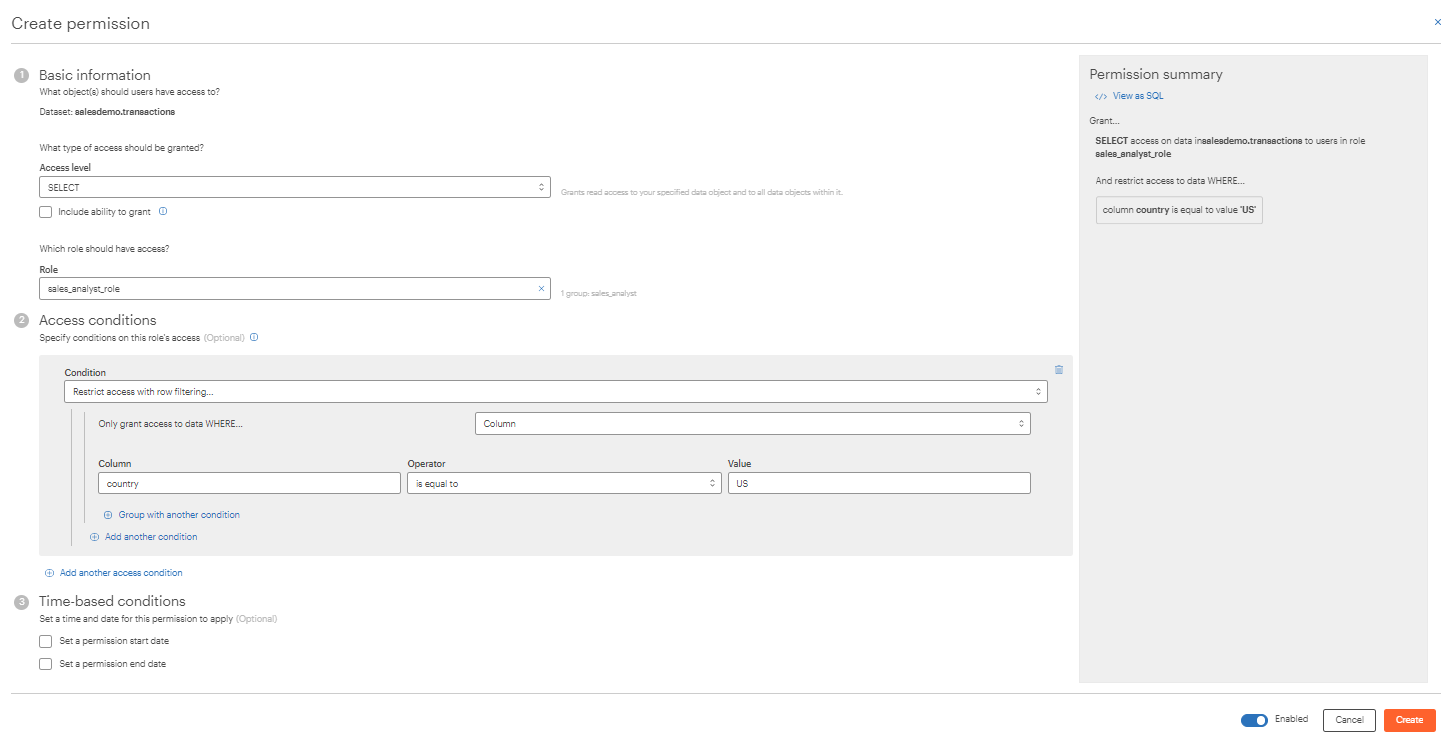
Here's the permission definition in SQL syntax:
GRANT SELECT ON TABLE `salesdemo`.`transactions`
WHERE `country` = 'US'
TO ROLE `sales_analyst_role`
POLICYPROPERTIES('enabled'='true');
Note: Row-level filter permissions can be applied at both the dataset or database level. However, if they are at the database-level, tables that do not contain the referenced column are no longer accessible.
An admin sees the original data with all data columns and no row filter, but users with the sales_analyst_role see only US data.
| User | Has Access? | What data do they see? |
|---|---|---|
| Admininistrators | ✅ | Original data |
Users with sales_analyst_role |
✅ | Can see the salesdemo.transactions table, except rows will be filtered for country='US'. |
Users without sales_analyst_role |
❌ | N/A |
User-Attribute-Based Row-Level Location Filtering¶
In this example, we grant access to transactions data in the salesdemo database for all users with the sales_analyst_role when the transaction territory is the same as users.
Here's what the permission definition looks like in the permission builder. We give access to the sales.transactions table an, using the column value territory as a row filter.
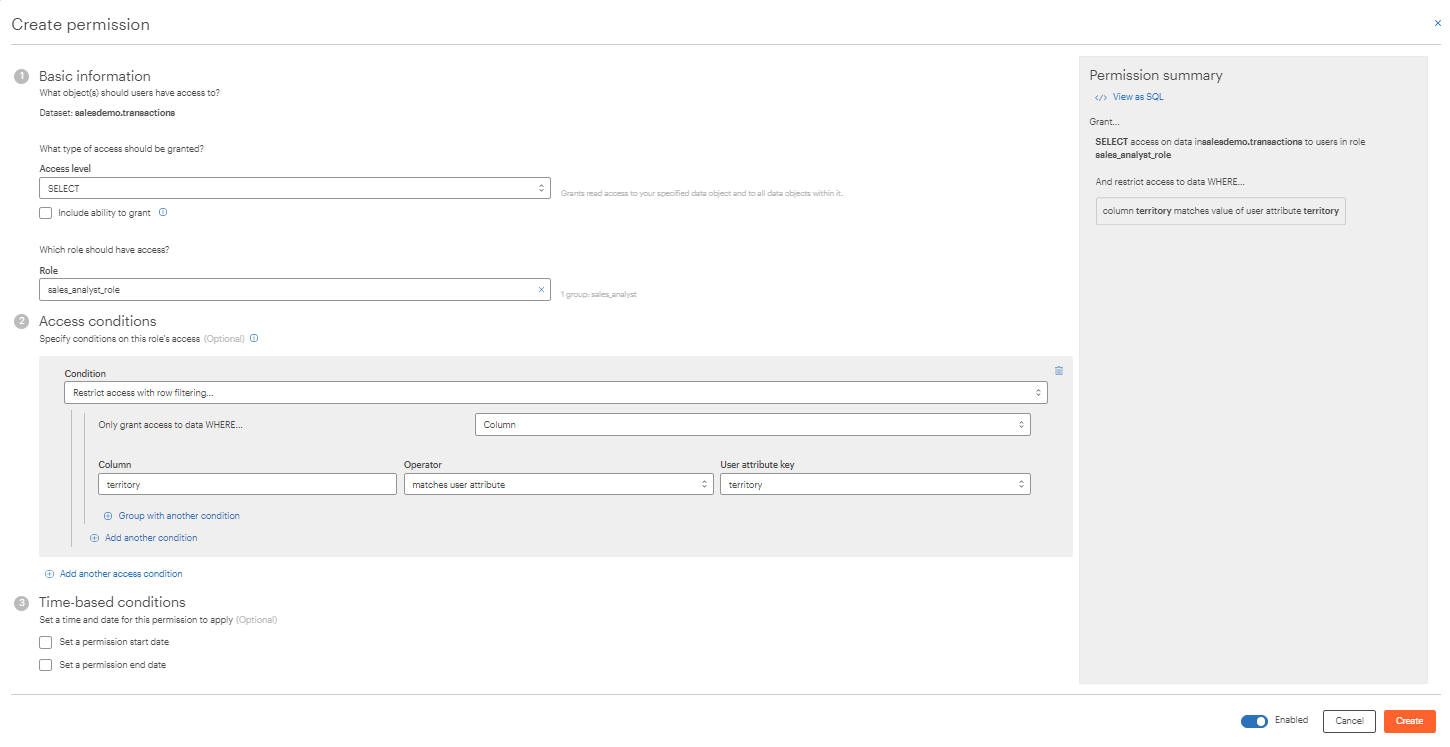
Here is the permission definition in SQL syntax:
GRANT SELECT ON TABLE `salesdemo`.`transactions`
WHERE sets_intersect(`territory`, user_attribute('territory'))
TO ROLE `sales_analyst_role`
POLICYPROPERTIES('enabled'='true');TO ROLE analyst_role;
An admin sees the original data with all data columns and no row filter, but users with the sales_analyst_role see only data corresponding to their assigned territory.
| User | Has Access? | What data do they see? |
|---|---|---|
| Admininistrators | ✅ | Original data |
Users with sales_analyst_role |
✅ | Can see the salesdemo.transactions table, except rows are filtered for column territory=user attribute('territory'). |
Users without sales_analyst_role |
❌ | N/A |
Example 5: Conditional Transformation or Cell-Level Permissions¶
You can create permission definitions that transform a column depending on its value. In this example, we give access to any datasets in the healthcare database for users with the sales_analyst_role, but we mask total charges if they are greater than 3000.00.
Here's what the permission definition looks like in the permission builder. We leverage the SQL if statement to place a conditional check to determin if the value is greater than 3000.00.
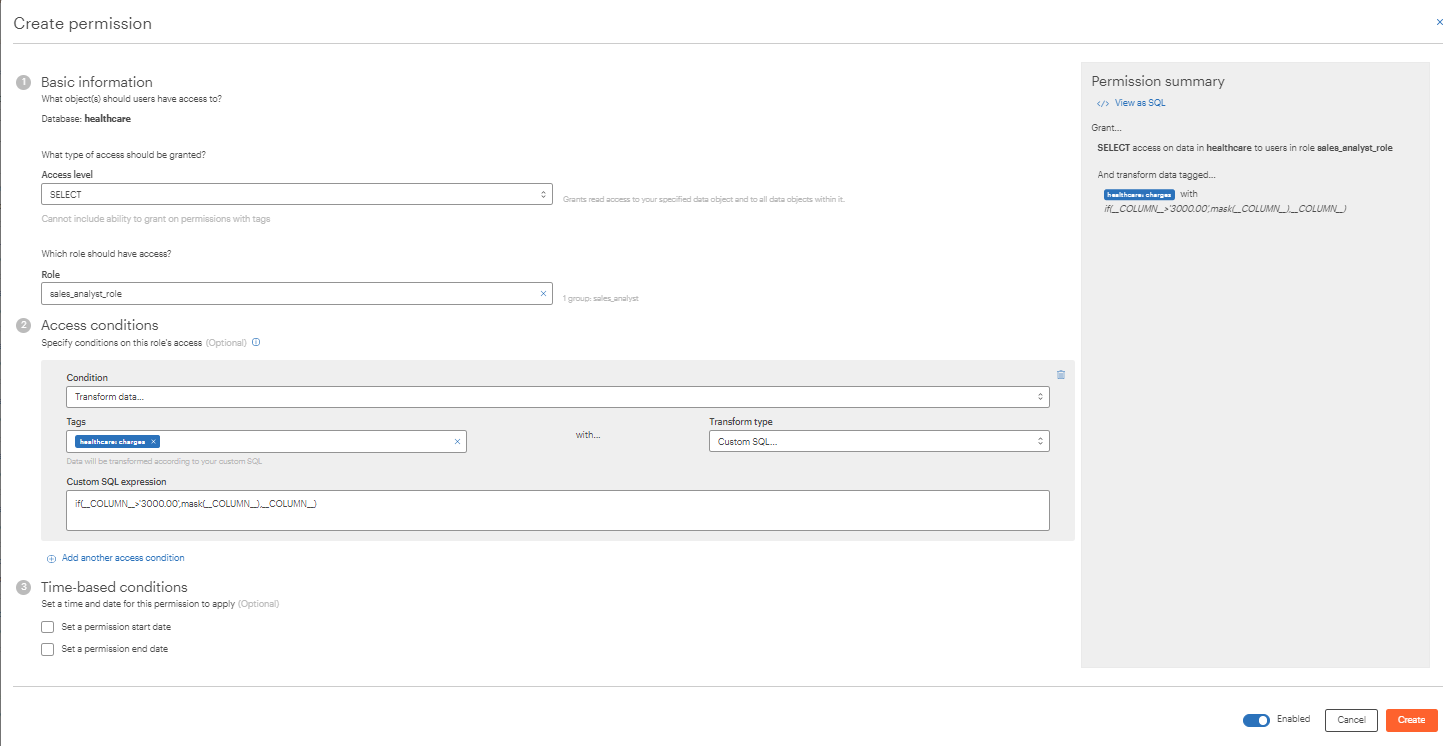
Here's the permission definition in SQL syntax:
GRANT SELECT ON DATABASE `healthcare`
TRANSFORM `healthcare`.`charges` WITH if(__COLUMN__>'3000.00',mask(__COLUMN__),__COLUMN__)
TO ROLE `sales_analyst_role`
POLICYPROPERTIES('enabled'='true');
An admin sees the original data with all data columns and no transformation, but users with the sales_analyst_role cannot see total charges if they are over 3000.00.
| User | Has Access? | What data do they see? |
|---|---|---|
| Admininistrators | ✅ | Original data |
Users with sales_analyst_role |
✅ | Can see any table inside the healthcare database, except any column tagged healthcare.charges has values masked if they are over 3000.00. |
Users without sales_analyst_role |
❌ | N/A |